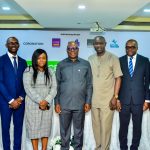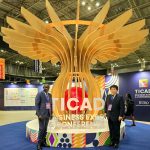Fidson Healthcare Plc has assured that the company would build on its impressive historic growth and provide investors with good returns in the years ahead.
The assurance was given by the board and management of company, at the presentation of its Facts-Behind-the-Figure, at the floor of the Nigerian Stock Exchange (NSE). The company is currently seeking N3 billion via an offer by way of rights issues. It is offering 750 million shares at N4.00 per share.
According to the offer document, about 60 per cent of the issue proceeds would be applied towards taking out expensive short-term debts, thereby reducing finance cost by about 50 per cent on an annualized basis going forward.
Speaking during the presentation in Lagos, the head of Finance and Accounts of Fidson Healthcare, Imokha Ayebae, puts the company’s projected earnings from sales for the 2019 financial year at N20.083 billion while profit before tax is targeted at N3.444 billion; rising by 2020 to N23.095 billion and N3.926 billion respectively. By 2023, the management believed revenue will hit N25.125 billion and profit, N5.971 billion.
Meanwhile, Fidson Healthcare Plc recently released its 2018 audited financial report to the Nigerian Stock Exchange, reporting a 15% growth in turnover from N14.06bn in 2017 to N16.23bn in 2018. The increase in revenue was as a result of volume growth from expanded production at its new WHO compliant factory. The plant, which was commissioned in 2016, is a key driver of the company’s growth strategy and local sourcing initiatives. The new factory is one of the most sophisticated manufacturing facilities in Africa and is well positioned to meet the rising demand for medicines in Nigeria and the broader West-African region.
The growth in revenue was achieved despite a challenging year for the pharmaceutical industry, which saw some therapeutic substances banned by the government and costs increasing on key production inputs. As a result of these challenges, the Company’s Cost of Sales went up by over 40% from N6.90bn in 2017 to N9.91bn in 2018. Other factors that affected its Cost of Sales include increased logistics cost for imported materials due to congestion at the seaports which drove up the cost of transporting goods from the ports by 1000%. These factors, together with price depressions that affected some generic products, led to a drop in Gross Margin by 11 percentage points.
The Company also intends to take advantage of the fund raise to inject fresh working capital into the business in order to maximize the opportunities that exist in the market. A revenue growth of over 20% is projected for 2019, with increased focus on growing its ethical product segments. The business development work being done in hospitals to enhance the patronage of Fidson brands is also expected to increase demand. About 20 new products will be introduced into the market in 2019 to take advantage of the available capacity at the new factory.
Besides the coming on stream of its new factory and increased capacity utilization, Ayebae said they would deploy cost cutting measures to help achieve the target, such as lowering finance cost with the fresh capital, among others and increase in product prices.
Imokha further stated that there were plans to reduce energy cost from the current 40 per cent of total by moving from diesel to gas fired power generators, eliminating middlemen and introducing new products.
He attributed the drop in revenue and profit in 2018, to a combination of increased costs due to scarcity and cost of raw materials, besides the naira devaluation and Nigeria’s port congestion, all of which has impacted operating costs that could not be passed to consumers, at a time about 95 per cent of raw materials in the country were imported.
The prospects look good for Fidson in the near-term, enabling the Company to cement its leadership position in the pharmaceutical industry




